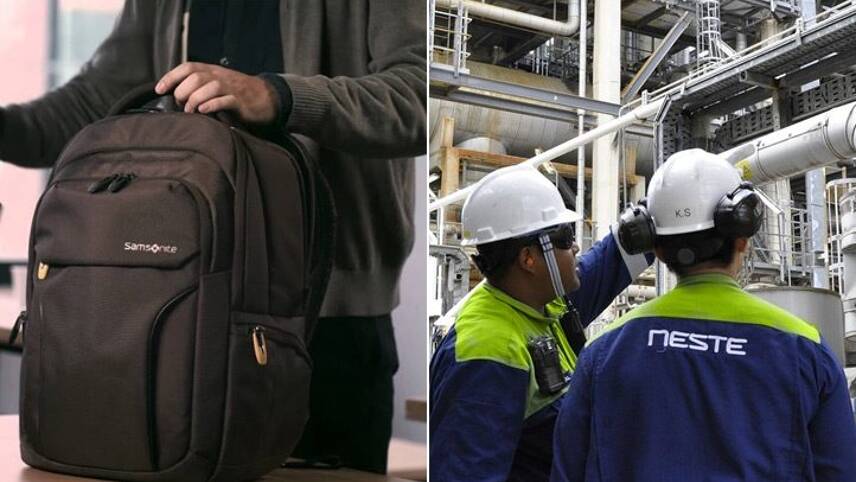Register for free and continue reading
Join our growing army of changemakers and get unlimited access to our premium content

Images: Samsonite/Neste
Samsonite’s carbon commitment has been made as part of a new sustainability strategy called “Our Responsible Journey”. It covers Scope 1 (direct) and Scope 2 (power-related) emissions.
In order to meet the commitment, Samsonite has pledged to shift to 100% renewable energy within the next five years. The company is already investing in onsite solar, including an 8,000-square-metre rooftop array on its factory in India, and says it will explore more renewable tariffs and Power Purchase Agreements (PPAs) going forwards.
Other moves to help Samsonite meet its 2025 targets will include investment in energy efficiency technologies at owned and operated facilities, and in natural climate solutions which enable the sequestration of carbon across the supply chain. Reforestation and afforestation will form the majority of Samsonite’s investment in natural offsetting, given that it has a history of investment in this space. It claims it has financed the planting of more than 700,000 trees since it was founded 110 years ago.
In addition to carbon, ‘Our Responsible Journey’ includes resource commitments to decrease the use of virgin, fossil-based plastics in products and packaging, and to increase the availability of repair services to customers globally. Social commitments, including an expansion of Samsonite’s social compliance programme regarding modern slavery in supply chains, are also included.
“While we’ve been focused on sustainability for several years, ‘Our Responsible Journey’ is how we will accelerate the implementation of sustainable business practices globally to meet our goals,” Samsonite International’s chief executive Kyle Gendreau said. “This strategy will touch every aspect of our business to help us further our long-standing leadership in the industry.”
Neste
Alternative fuel firm Neste has also set a new carbon target, unveiling plans to reach carbon-neutral production by 2035.
The target covers Scope 1 and 2 emissions related to Neste’s fuel production and builds on a previous commitment to reduce Scope 3 emissions for customers by 20 million tonnes annually by 2030.
In order to reach the 2035 commitment, which is aligned with Finland’s net-zero target, Neste’s chief executive Peter Vanacker said the firm will need to implement “new ways of thinking, innovation and plenty of cooperation”.
Neste says it is analysing “all aspects of emissions” in production in order to reach its targets. Key moves will be further increasing energy efficiency; increasing renewable energy sourcing for production sites; increasing internal carbon pricing; investing in innovations such as electrolysis for hydrogen and backing carbon capture and storage (CCS).
The firm said it will also invest in “reliable” offsetting schemes for emissions which cannot be mitigated through the above actions, later in its transition. It said in a statement, however, that it has up to 50 measures to introduce before offsetting is used.
Neste’s announcement comes just weeks after key members of the UK aviation industry, including Boeing, Virgin Atlantic and London City Airport, signed a roadmap for reaching net-zero by 2050 that relies heavily on alternative fuels.
Penned by the UK Sustainable Aviation Commission and praised by the Department for Transport (DfT), the roadmap states that alternative and sustainable fuels could account for one-third of the UK’s demand for aviation fuel by 2050. But critics have pointed out that such fuels accounted for less than 0.5% of global aviation fuel consumption in 2018.
Sarah George


Please login or Register to leave a comment.